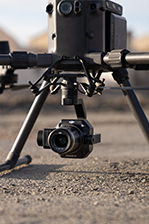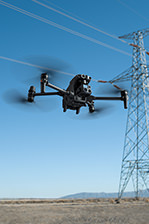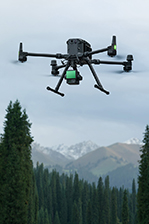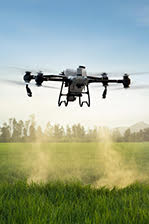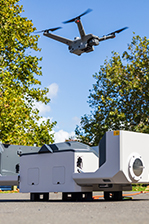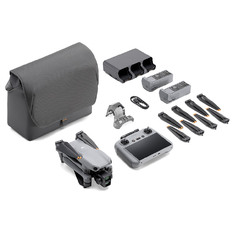Double Up
DJI Air 3 is a compact foldable drone with two powerful cameras— a wide-angle and a 3x medium telephoto. Enjoy optimised flights with a 46-minute max flight time, [1] omnidirectional obstacle sensing, [2] and O4 video transmission. And capture breathtaking details of any scene with dual-camera 48MP photos and 4K HDR video. With Air 3, film your subjects with unlimited creativity and tell a bold visual story.
| Wide-Angle & 3x Medium Tele, Subjects that Tell a Story | 46-Min Max Flight Time, [1] Extended Air Time | Omnidirectional Obstacle Sensing, [2] All-Around Protection |
| Dual-Camera 48MP Photos, Superior Details | Dual-Camera 4K/60fps HDR Videos, Effortlessly Epic Imaging |
New O4 Video Transmission More Range with More Stability |
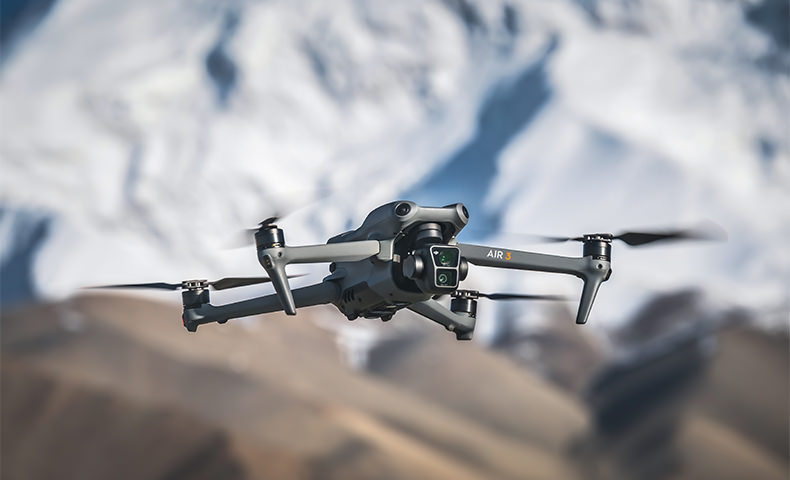
Dual-Primary-Camera System
Air 3 boasts the first dual-primary camera system of the Air series, embedding a 1/1.3-inch-CMOS wide-angle camera and a 1/1.3-inch-CMOS 3x medium tele camera in a sleek and compact body. The two cameras have the same sensor size but different focal lengths, delivering consistent image quality [3] and more dynamic imaging possibilities.
Complementary Camera Performance
With the wide-angle camera, sweeping landscapes can be more fully captured.
And the 3x medium tele camera achieves lossless 3x optical zoom for spatial compression that provides a unique perspective of any subject.
Iconic from Every Angle
Use the expansive FOV of the wide-angle camera to capture more of any landscape. Switch to the 3x medium tele camera to frame any subject as a bold focal point.
Dual-Camera 48MP Photos
Both cameras are capable of delivering 48MP photos filled with true-to-life details that look great and allow seamless cropping in post for those who need it.
Dual-Camera 4K/60fps HDR Videos
Air 3’s two 1/1.3-inch CMOS sensors support dual native ISO for direct output of 4K/60fps HDR video without cropping. This means footage from either camera can be packed with rich colouring and natural lighting transitions for breathtaking and highly-accurate results.
Max Video Specification - 4K/100fps [4]
HDR Video - Up to 4K/60fps
Colour Modes - 10-bit D-Log M, 10-bit HLG
Both cameras also support 10-bit D-Log M and 10-bit HLG colour modes. 10-bit D-Log M mode helps retain more highlight and shadow details for increased flexibility when editing. While 10-bit HLG mode can present a higher dynamic range, achieving excellent imaging results without colour grading.
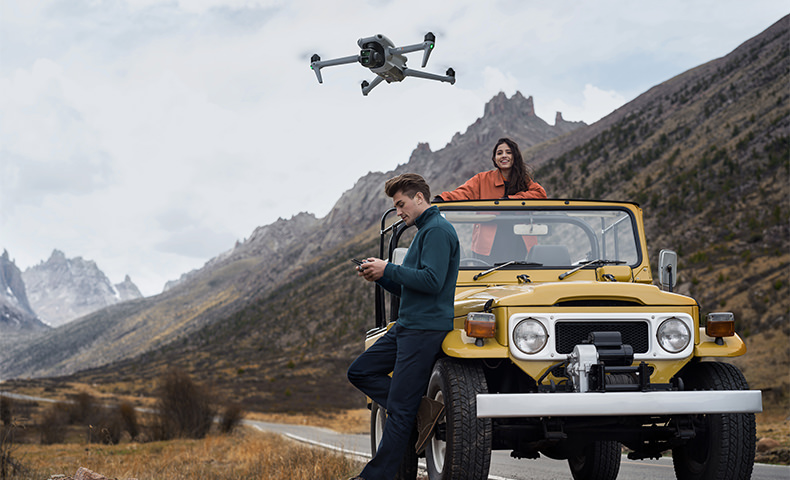
Fly Confident, Fly Safe
Extended Flight, Innovative Charging
Air 3 offers up to 46 minutes of flight time, [1] an increase of 48% [5] compared to the previous generation. This provides plenty of time to explore, adjust compositions, and get the shots you want, all during a single flight.
The new battery charging hub supports an innovative power transfer function. Simply press and hold the function button to transfer the remaining power from multiple batteries to the battery with the highest remaining power, [6] giving you a more fully charged battery in situations where charging options are limited.
Omnidirectional Obstacle Sensing
An omnidirectional sensing system enables comprehensive environmental awareness, allowing Air 3 to detect obstacles in all directions. [2] When obstacles are detected, Air 3 can use APAS 5.0 to perform smoother avoidance movements [7] for a safer overall flight experience. Even complete beginners can now fly with confidence and execute creative ideas with enhanced safety.
O4 Video Transmission
The next-gen O4 video transmission system empowers Air 3 with dramatically enhanced transmission performance. It provides a max range of 20 km [8] with increased stability, and a 1080p/60fps max-quality live feed to ensure ultra-smooth viewing and operating.
Advanced RTH
During Smart RTH, Air 3 will automatically plan an optimised flight route for Advanced RTH, [9] while maintaining omnidirectional obstacle sensing [2] to return to its home point quickly and safely.
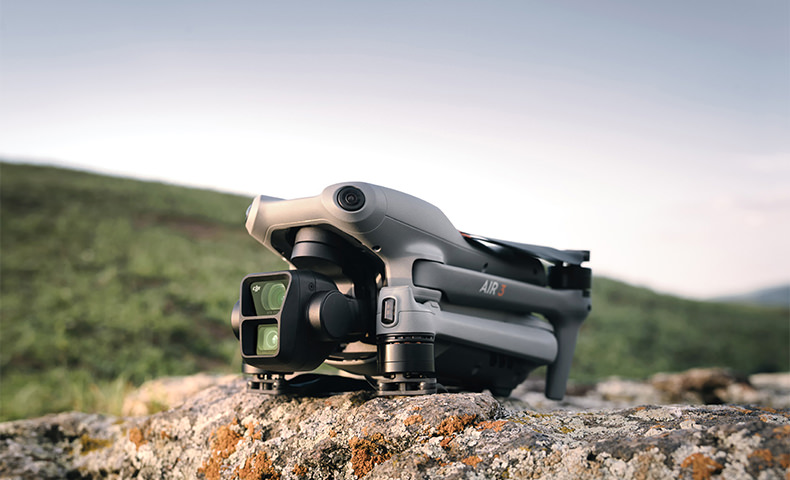
Intelligent Features to Fly Inspired
Effortlessly Cutting-Edge
FocusTrack
FocusTrack keeps you or your subject easily in the centre of the frame. The 3x medium tele camera unlocks a unique sense of spatial compression when highlighting subjects. This updated tracking performance combined with omnidirectional obstacle sensing lets you get intelligent, well-planned shots whenever and wherever you need them.
QuickShots
QuickShots empower Air 3 with creative camera movement options like Rocket, Dronie, Circle, Helix, Boomerang, and Asteroid. [10]
2.7K Vertical Shooting
Air 3 supports 2.7K vertical shooting with both cameras, giving vertical footage a superbly dynamic look when capturing landscapes or subjects. The 2.7K vertical shot output directly from the 4:3 CMOS delivers clips that are optimised for smartphone viewing and ready to share on social media without any cropping needed in post.
MasterShots
MasterShots allows Air 3 to automatically perform diverse camera movements, shooting multiple clips and editing them with music, cuts, and effects for fast and simplified cinematic footage.
More Features, Expanded Creativity
Night Mode - Thanks to an advanced noise reduction algorithm, Air 3 can capture noise-free footage at up to 4K/30fps in low-light environments or at night.
Hyperlapse - Select from four options, including Free, Circle, Course Lock, and Waypoint to capture timelapse footage at up to 4K horizontally or 2.7K vertically.
Slow Motion - Select 4K/100fps [4] or 1080p/100fps [4] to directly record a 4x slow-motion video.
SmartPhoto 3.0 - In single shot mode, Air 3 uses SmartPhoto 3.0 by default, which can automatically select among HDR, hyperlight, and scene recognition according to the scenario for better imaging results. In HDR DNG format, [11] the camera can record a larger dynamic range with built-in contrast enhancement.
QuickTransfer - Quickly download photos and videos from the aircraft to your smartphone through a wireless connection, saving time and effort.
LightCut App
Connect to Air 3 wirelessly via the LightCut app on your smartphone for expanded creative options such as One-Tap Edit. There is no need to download all the footage during the process, which helps save storage space on your mobile device.
One-Tap Edit - Intelligently selects clips based on composition and flight path and automatically matches optimal template options and sound effects to generate a quick and effortlessly cinematic video.
Tilt-Shift Effects - Enjoy a tilt-shift effect with just one tap. Apply this feature to footage shot with the 3x medium tele camera for even more dramatic results.

Hyper-Advanced Shooting
Waypoint
For the first time ever, the Waypoint feature is now available on the Air series. Plan flight routes and shooting actions for Air 3 in advance to achieve difficult camera movements and stunning one-takes. You can also save flight routes to repeat the same movement with precision at a later time or date, opening the door to long-duration timelapse shots that capture transitions like day to night or season to season.
Notes
1. Measured by DJI Air 3 flying at a constant speed of 28.8 kph in a windless environment at sea level, with APAS off, AirSense off, camera parameters set to 1080p/24fps, video mode off, and from 100% battery level until 0%. Data is for reference only. Always pay attention to reminders in the app during flight.
2. DO NOT use the aircraft in severe weather conditions, including heavy wind exceeding 12 m/s, snow, rain, fog, hail, or lightning. DO NOT fly the aircraft 6000 m (19,685 ft.) or higher above sea level. DO NOT fly the aircraft in environments where the temperature is below -10° C (14° F) or above 40° C (104° F). DO NOT take off from moving objects such as cars or boats. DO NOT fly close to reflective surfaces such as water or snow. Otherwise, the vision system may not work correctly. When the GNSS signal is weak, fly the aircraft in environments with good lighting and visibility. Low ambient light may cause the vision system to function abnormally. DO NOT fly near areas with magnetic or radio interference. Familiar magnetic or radio interference sources include Wi-Fi hotspots, routers, Bluetooth devices, high-voltage lines, large-scale power transmission stations, radar stations, mobile base stations, and broadcasting towers. Avoid sand entering the aircraft when taking off in desert or beach areas. Fly the aircraft in open areas away from crowds. Buildings, mountains, and trees may block the GNSS signal and affect the onboard compass.
3. The wide-angle camera and 3x medium tele camera have different apertures.
4. Recording frame rates. The corresponding video plays as slow-motion video.
5. Compared with DJI Air 2S.
6. DO NOT connect the charger, connect external devices, or insert/remove any batteries when using the power accumulation function.
7. The obstacle avoidance action should be set to Bypass in the app.
8. Measured in an outdoor, open environment, without interference, and with FCC compliance. The above data shows the farthest communication range for one-way, non-return flights. Pay attention to reminders in the app during your flight.
9. Only available when ambient light meets the working conditions of the vision systems. Always pay attention to the surroundings and app warnings. For specific usage conditions, please refer to the product user manual.
10. The 3x medium tele camera does not support the Asteroid QuickShot.
11. DJI Air 3 saves photos in HDR DNG format when the aircraft is stationary and the exposure parameters are automatically set in Auto or Pro mode.
Product Specifications
Aircraft
Takeoff Weight: 720 g
Dimensions: Folded (without propellers): 207×100.5×91.1 mm (L×W×H)
Unfolded (without propellers): 258.8×326×105.8 mm (L×W×H)
Max Ascent Speed: 10 m/s
Max Descent Speed: 10 m/s
Max Horizontal Speed (at sea level, no wind): 21 m/s
19 m/s in EU regions.
Max Takeoff Altitude: 6000 m
Max Flight Time: 46 minutes
Measured by DJI Air 3 flying at a constant speed of 28.8 kph in a windless environment at sea level, with APAS off, AirSense off, camera parameters set to 1080p/24fps, video mode off, and from 100% battery level until 0%. Data is for reference only. Always pay attention to reminders in the app during your flight.
Max Hovering Time: 42 minutes
Measured by DJI Air 3 hovering in a windless environment at sea level, with APAS off, AirSense off, camera parameters set to 1080p/24fps, video mode off, and from 100% battery level until 0%. Data is for reference only. Always pay attention to reminders in the app during your flight.
Max Flight Distance: 32 km
Max Wind Speed Resistance: 12 m/s
Max Pitch Angle: 35°
Operating Temperature: -10° to 40° C (14° to 104° F)
Global Navigation Satellite System: GPS + Galileo + BeiDou
Hovering Accuracy Range: Vertical:
±0.1 m (with vision positioning)
±0.5 m (with GNSS positioning)
Horizontal:
±0.3 m (with vision positioning)
±0.5 m (with high-precision positioning system)
Internal Storage: 8 GB
Camera
Image Sensor: Wide-Angle Camera: 1/1.3-inch CMOS, Effective Pixels: 48 MP
Medium Tele Camera: 1/1.3-inch CMOS, Effective Pixels: 48 MP
Lens: Wide-Angle Camera
FOV: 82°
Format Equivalent: 24 mm
Aperture: f/1.7
Focus: 1 m to ∞
Medium Tele Camera
FOV: 35°
Format Equivalent: 70 mm
Aperture: f/2.8
Focus: 3 m to ∞
ISO Range: Video
Normal and Slow Motion:
100-6400 (Normal)
100-1600 (D-Log M)
100-1600 (HLG)
Night:
100-12800 (Normal)
Photo
100-6400
Shutter Speed: Wide-Angle Camera
12MP Photo: 1/16000-2 s (2-8 s for simulated long exposure)
48MP Photo: 1/8000-2 s
Medium Tele Camera
12MP Photo: 1/16000-2 s (2-8 s for simulated long exposure)
48MP Photo: 1/8000-2 s
Max Image Size: Wide-Angle Camera: 8064×6048
Medium Tele Camera: 8064×6048
Still Photography Modes: Wide-Angle Camera
Single Shot: 12 MP and 48 MP
Burst Shooting: 12 MP, 3/5/7 frames; 48 MP, 3/5 frames
Automatic Exposure Bracketing (AEB): 12 MP and 48 MP, 3/5 frames at 0.7 EV step
Timed: 12 MP, 2/3/5/7/10/15/20/30/60 s; 48 MP, 5/7/10/15/20/30/60 s
Medium Tele Camera
Single Shot: 12 MP and 48 MP
Burst Shooting: 12 MP, 3/5/7 frames; 48 MP, 3/5 frames
Automatic Exposure Bracketing (AEB): 12 MP and 48 MP, 3/5 frames at 0.7 EV step
Timed: 12 MP, 2/3/5/7/10/15/20/30/60 s; 48 MP, 5/7/10/15/20/30/60 s
Photo Format: JPEG/DNG (RAW)
Video Resolution: Wide-Angle Camera:
H.264/H.265
4K: 3840×2160@24/25/30/48/50/60/100*fps
FHD: 1920×1080@24/25/30/48/50/60/100*/200*fps
2.7K Vertical Shooting: 1512×2688@24/25/30/48/50/60fps
FHD Vertical Shooting: 1080×1920@24/25/30/48/50/60fps
Medium Tele Camera:
H.264/H.265
4K: 3840×2160@24/25/30/48/50/60/100*fps
FHD: 1920×1080@24/25/30/48/50/60/100*/200*fps
2.7K Vertical Shooting: 1512×2688@24/25/30/48/50/60fps
FHD Vertical Shooting: 1080×1920@24/25/30/48/50/60fps
* Recording frame rates. The corresponding video plays as slow-motion video. 4K/100fps only supports H.265.
Video Format: MP4 (MPEG-4 AVC/H.264, HEVC/H.265)
Max Video Bitrate: H.264/H.265: 150 Mbps
Supported File System: exFAT
Colour Mode and Sampling Method: Wide-Angle Camera
Normal: 8-bit 4:2:0 (H.264/H.265)
HLG/D-Log M: 10-bit 4:2:0 (H.265)
Medium Tele Camera
Normal: 8-bit 4:2:0 (H.264/H.265)
HLG/D-Log M: 10-bit 4:2:0 (H.265)
Digital Zoom: Wide-Angle Camera: 1-3x
Medium Tele Camera: 3-9x
Gimbal
Stabilization: 3-axis mechanical gimbal (tilt, roll, pan)
Mechanical Range: Tilt: -135° to 70°
Roll: -50° to 50°
Pan: -27° to 27°
Controllable Range: Tilt: -90° to 60°
Pan: -5° to 5°
Max Control Speed (tilt): 100°/s
Angular Vibration Range: ±0.0037°
Sensing
Sensing Type: Omnidirectional binocular vision system, supplemented with an infrared sensor at the bottom of the aircraft
Forward: Measurement Range: 0.5-18 m
Detection Range: 0.5-200 m
Effective Sensing Speed: Flight Speed ≤ 12 m/s
FOV: Horizontal 90°, Vertical 72°
Backward: Measurement Range: 0.5-18 m
Effective Sensing Speed: Flight Speed ≤ 12 m/s
FOV: Horizontal 90°, Vertical 72°
Lateral: Measurement Range: 0.5-30 m
Effective Sensing Speed: Flight Speed ≤ 12 m/s
FOV: Horizontal 90°, Vertical 72°
Upward: Measurement Range: 0.5-18 m
Effective Sensing Speed: Flight Speed ≤ 6 m/s
FOV: Front and Back 72°, Left and Right 90°
Downward: Measurement Range: 0.3-14 m
Effective Sensing Speed: Flight Speed ≤ 6 m/s
FOV: Front and Back 106°, Left and Right 90°
Operating Environment: Forward, Backward, Left, Right, and Upward:
Surfaces with discernible patterns and adequate lighting (lux > 15)
Downward:
Surfaces with discernible patterns, diffuse reflectivity > 20% (e.g. walls, trees, people), and adequate lighting (lux > 15)
3D Infrared Sensor: Measurement Range: 0.1-8 m (reflectivity > 10%)
FOV: Front and Back 60°, Left and Right 60°
Video Transmission
Video Transmission System: O4
Live View Quality: Remote Controller:
1080p/30fps, 1080p/60fps
Operating Frequency: 2.4000-2.4835 GHz
5.170-5.250 GHz
5.725-5.850 GHz
5.170-5.250 GHz can be used only in countries and regions where permitted by local laws and regulations.
Transmitter Power (EIRP): 2.4 GHz:
< 33 dBm (FCC)
< 20 dBm (CE/SRRC/MIC)
5.1 GHz:
< 23 dBm (CE)
5.8 GHz:
< 33 dBm (FCC)
< 30 dBm (SRRC)
< 14 dBm (CE)
Max Transmission Distance (unobstructed, free of interference): FCC: 20 km
CE: 10 km
SRRC: 10 km
MIC: 10 km
Measured in an unobstructed outdoor environment free of interference. The above data shows the farthest communication range for one-way, non-return flights under each standard. Always pay attention to RTH reminders in the app during your flight.
Max Transmission Distance (unobstructed, with interference): Strong Interference: urban landscape, approx. 1.5-4 km
Medium Interference: suburban landscape, approx. 4-10 km
Low Interference: suburb/seaside, approx. 10-20 km
Data tested under FCC standard in unobstructed environments with typical interference. Used for reference purposes only and provides no guarantee for actual transmission distance.
Max Transmission Distance (obstructed, with interference): Low Interference and Obstructed by Buildings: approx. 0-0.5 km
Low Interference and Obstructed by Trees: approx. 0.5-3 km
Data tested under FCC standard in obstructed environments with typical low interference. Used for reference purposes only and provides no guarantee for actual transmission distance.
"Max Download Speed: O4:
10 MB/s (with DJI RC-N2 Remote Controller)
10 MB/s (with DJI RC 2)
Wi-Fi 5: 30 MB/s*
* Measured in a laboratory environment with little interference in countries/regions that support both 2.4 GHz and 5.8 GHz. Download speeds may vary depending on the actual conditions.
Lowest Latency: Aircraft + Remote Controller: approx. 120 ms
Depending on the actual environment and mobile device.
Antenna: 6 antennas, 2T4R
Wi-Fi
Protocol: 802.11 a/b/g/n/ac
Operating Frequency: 2.400-2.4835 GHz
5.725-5.850 GHz
Transmitter Power (EIRP): 2.4 GHz:
< 20 dBm (FCC/CE/SRRC/MIC)
5.8 GHz:
< 20 dBm (FCC/SRRC)
< 14 dBm (CE)
Bluetooth
Protocol: Bluetooth 5.2
Operating Frequency: 2.400-2.4835 GHz
Transmitter Power (EIRP): < 10 dBm
Battery
Capacity: 4241 mAh
Weight: Approx. 267 g
Nominal Voltage: 14.76 V
Max Charging Voltage: 17 V
Type: Li-ion 4S
Energy: 62.6 Wh
Charging Temperature: 5° to 40° C (41° to 104° F)
Charging Time: Approx. 80 minutes (with DJI 65W Portable Charger)
Approx. 60 minutes (with DJI 100W USB-C Power Adapter and Battery Charging Hub)
Charger
Input: DJI 65W Portable Charger:
100-240 V (AC), 50-60 Hz, 2 A
DJI 100W USB-C Power Adapter:
100-240 V (AC), 50-60 Hz, 2.5 A
Output: DJI 65W Portable Charger:
USB-C
5 V, 5 A
9 V, 5 A
12 V, 5 A
15 V, 4.3 A
20 V, 3.25 A
5-20 V, 3.25 A
USB-A
5 V, 2 A DJI 100W USB-C Power Adapter:
Max 100 W (total)
When both ports are used, the max output power of one port is 82 W, and the charger will dynamically allocate the output power of the two ports according to the power load.
Rated Power: DJI 65W Portable Charger: 65 W
DJI 100W USB-C Power Adapter: 100 W
Battery Charging Hub
Input: USB-C: 5-20 V, max 5 A
Output (power accumulation): Battery Port: 12-17 V, 3.5 A
Output (charging): Battery Port: 12-17 V, max 5 A
Output (USB): USB-C:
5 V, 3 A
9 V, 5 A
12 V, 5 A
15 V, 5 A
20 V, 4.1 A
Charging Type: Three batteries charged in sequence.
Compatibility: DJI Air 3 Intelligent Flight Battery
Car Charger
Input: Car Power Input:
12.7-16 V, 6.5 A, rated voltage 14 V (DC)
Output: USB-C:
5 V, 5 A
9 V, 5 A
12 V, 5 A
15 V, 4.3 A
20 V, 3.25 A
5-20 V, 3.25 A
USB-A:
5 V, 2 A
Rated Power: 65 W
Charging Temperature: 5° to 40° C (41° to 104° F)
Storage
Recommended microSD Cards: SanDisk Extreme PRO 32GB V30 U3 A1 microSDHC
Lexar 1066x 64GB V30 U3 A2 microSDXC
Lexar 1066x 128GB V30 U3 A2 microSDXC
Lexar 1066x 256GB V30 U3 A2 microSDXC
Lexar 1066x 512GB V30 U3 A2 microSDXC
Kingston Canvas GO! Plus 64GB V30 U3 A2 microSDXC
Kingston Canvas GO! Plus 128GB V30 U3 A2 microSDXC
Kingston Canvas React Plus 64GB V90 U3 A1 microSDXC
Kingston Canvas React Plus 128GB V90 U3 A1 microSDXC
Kingston Canvas React Plus 256GB V90 U3 A1 microSDXC
Samsung EVO Plus 512GB V30 U3 A2 microSDXC
DJI RC-N2 Remote Controller
Model: RC151
Max Operating Time: Without charging any mobile device: 6 hours
When charging a mobile device: 3.5 hours
Max Supported Mobile Device Size: 180×86×10 mm (L×W×H)
Operating Temperature: -10° to 40° C (14° to 104° F)
Charging Temperature: 5° to 40° C (41° to 104° F)
Charging Time: 2.5 hours
Charging Type: It is recommended to use a 5V/2A charger.
Battery Capacity: 5200 mAh
Type: 18650 Li-ion
Dimensions: 104.22×149.95×45.25 mm (L×W×H)
Weight: 375 g
Supported Mobile Device Port Type: Lightning, USB-C, Micro-USB
Using a mobile device with Micro-USB port requires the DJI RC-N1 RC Cable (Standard Micro USB connector), which is sold separately.
Video Transmission Operating Frequency: 2.4000-2.4835 GHz
5.170-5.250 GHz
5.725-5.850 GHz
Video Transmission Transmitter Power (EIRP): 2.4 GHz:
< 33 dBm (FCC)
< 20 dBm (CE/SRRC/MIC)
5.1 GHz:
< 23 dBm (CE)
5.8 GHz:
< 33 dBm (FCC)
< 14 dBm (CE)
< 30 dBm (SRRC)
In the box
DJI Air 3 × 1 (EX DEMO)
DJI Air 3 Low-Noise Propellers (Pair) × 2
DJI Air 3 Gimbal Protector × 1
DJI Air 3 Intelligent Flight Battery × 1 (EX DEMO)
DJI RC 2 (EX DEMO)
(No Charging cable included)
Please Note - A wall charger is not included our recommended charger is the DJI 65W Portable Charger
WHY BUY FROM US?
By buying from Ferntech, you'll have the confidence that you are dealing directly with New Zealand's leading drone experts. Our staff are knowledgable drone pilots who offer expert advice, trusted support and superior specialist service. Only through us will you receive a full New Zealand warranty, phone and email support, and access to our certified Repairs Centre with DJI-qualified drone technicians. And we guarantee that we will have the best prices on the market — if not let us know and we will match any price (conditions apply).
Warranty Details
3 Month Ferntech Warranty
Compared with DJI Air 2S, what are the main upgrades of DJI Air 3?
DJI Air 3 has improved the camera system, video transmission system, vision sensing system, flight time, and intelligent features. Details are as follows: A 1/1.3-inch CMOS 70mm medium tele camera is added. The video transmission system is upgraded to the next-gen O4 HD video transmission system. The drone is equipped with an omnidirectional vision sensing system and supports Advanced Pilot Assistance Systems (APAS) 5.0. The max hovering time is 42 minutes*, and the max flight time is 46 minutes**. The drone supports Waypoint Flight, Advanced RTH, Cruise Control, QuickTransfer, and other intelligent functions.
* Measured with DJI Air 3 hovering in a windless environment at sea level, with APAS off, AirSense off, camera parameters set to 1080p/24fps, video mode off, and from 100% battery level until 0%. Data is for reference only. Always pay attention to reminders in the app during your flight.
** Measured with DJI Air 3 flying at a constant speed of 28.8 kph in a windless environment at sea level, with APAS off, AirSense off, camera parameters set to 1080p/24fps, video mode off, and from 100% battery level until 0%. Data is for reference only. Always pay attention to reminders in the app during your flight.
What is the certification level of DJI Air 3 in Europe?
DJI Air 3 is C1 certified by the European Union Aviation Safety Agency (EASA).
Does DJI Air 3 support vertical shooting?
Both the wide-angle camera and medium tele camera support vertical shooting (9:16), and the max shooting specification is 2.7K/60fps.
Does the DJI Air 3 medium tele camera support MasterShots?
Yes.
Does the DJI Air 3 medium tele camera support Panorama?
No.
Does the DJI Air 3 medium tele camera support QuickShots?
DJI Air 3 supports all QuickShots modes except for Asteroid.
Does DJI Air 3 support shooting D-Log M and HLG videos?
Both the wide-angle camera and medium tele camera support shooting 10-bit D-Log M and 10-bit HLG videos. 10-bit D-Log M mode facilitates more flexible color grading in post-production, and 10-bit HLG mode can achieve previews with higher dynamic range (requires equipment that supports HDR display).
Which remote controllers are compatible with DJI Air 3?
DJI RC-N2 and DJI RC 2.
Compared with the O3 video transmission system, what are the upgrades of the O4 video transmission system?
The O4 video transmission system adopts an all-new hardware solution. The aircraft antenna system is upgraded from four antennas to six, and a new frequency band* has been added. The communication algorithm has also been upgraded, which not only delivers an FHD video transmission from a max range of 20 km**, but also features enhanced anti-interference capabilities, further improving the transmission stability in complex environments like urban settings. The remote controller also supports a 1080p/60fps max real-time live feed, with the higher frame rate delivering a smoother viewing experience.
* Can be used only in countries and regions where it is allowed by local laws and regulations.
** Measured in an open outdoor environment without interference and with FCC compliance. The above data shows the farthest communication range for one-way, non-return flights. Always pay attention to reminders in the app during your flight.
Does the max transmission distance of the O4 video transmission system vary according to the interference level of the environment?
In different environments, the wireless interference level is different, and the max transmission distance will vary.
Unobstructed:
Strong Interference: urban landscapes, approx. 1.5-4 km
Medium Interference: suburban landscapes, approx. 4-10 km
Low Interference: suburbs/seaside, approx. 10-20 km
Obstructed:
Low Interference and Obstructed by Buildings: approx. 0-0.5 km
Low Interference and Obstructed by Trees: approx. 0.5-3 km
Data tested under FCC standard in obstructed or unobstructed environments with typical interference. Used for reference purposes only and provides no guarantee for actual transmission distance.
Compared with the DJI RC-N1 Remote Controller, what are the upgrades of the DJI RC-N2 Remote Controller?
The video transmission solution has been upgraded, and the antenna system is upgraded from 1T2R to 2T2R. With DJI Air 3, the O4 video transmission can be used.
Compared with DJI RC, what are the upgrades of DJI RC 2?
The performance of the processor is improved for smoother operation. The video transmission solution has been upgraded, and the antenna system has been upgraded from 1T2R to 2T4R. With DJI Air 3, O4 video transmission can be used. DJI RC 2 features two built-in antennas and two external antennas, and also allows angle adjustments for the external dual antennas to achieve better video transmission effects.
Does DJI Air 3 support omnidirectional obstacle sensing?
Yes.
How is ActiveTrack 5.0 different from ActiveTrack 4.0?
ActiveTrack 5.0 can track subjects in eight directions, enabling more creative possibilities. Embedded with advanced subject recognition technology, ActiveTrack 5.0 uses multiple vision sensors simultaneously to recognize a subject, differentiate it from other objects, and lock the subject in the frame. It allows you to adjust tracking angles smoothly for more natural results. Thanks to the new environment and subject-sensing algorithms, DJI Air 3 responds earlier to subject movements and environmental information and plans an optimal tracking route to record smooth and stable footage.
How do I update the firmware of DJI Air 3?
You can either update the firmware on the DJI Fly app or by using DJI Assistant 2 (Consumer Drones Series) desktop software. Details for both firmware update methods can be found on the official website.
Which app is used with DJI Air 3? Where can I download it?
The DJI Fly app. You can visit the Downloads page of DJI Air 3 (https://www.dji.com/air-3/downloads) on the official DJI website to find the latest app version.
How long does it take to fully charge a DJI Air 3 Intelligent Flight Battery?
Approximately 80 minutes when charging with the connected USB-C charging cable of the DJI 65W Portable Charger. Approximately 60 minutes when charging with the DJI 100W USB-C Power Adapter and DJI Air 3 Battery Charging Hub.
What are the upgrades of the DJI Air 3 Battery Charging Hub compared to the previous generation?
The new battery charging hub supports the power accumulation function and an external discharge function. It also adopts an upgraded structure for convenient carrying. With the power accumulation function, you can simply press and hold the function button to transfer the remaining power from multiple batteries to the battery with the highest remaining power, enabling a longer effective flight time. With the external discharge function, you can use the battery charging hub as a power bank and output the battery power to mobile phones, tablets, and other devices through the USB-C port at a power of up to 82 W.
Can I use other chargers with USB-C ports to charge the battery?
Yes. However, to ensure charging efficiency, we recommended using the DJI 65W Portable Charger, DJI 100W USB-C Power Adapter, or other chargers at 60W or above that support the PD protocol.
Can I charge the battery through the USB-C port on the DJI Air 3 aircraft?
Yes.
There's currently no reviews for this product, be the first to write one.









